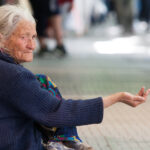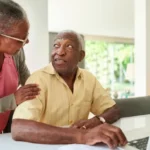Many people know someone who is caring for a terminally ill spouse, these gracious people put their own needs aside to fulfill the vows many of us spoke on our wedding day. AARP says that in 2020 a survey of 49.7 million caregivers for adults over the age of 18 showed that 12% are caring for a spouse. Health Affairs reported that 55% of older spouses experience their end of life caregiving with no help from adult children, other family members or paid home health aides. Isolation is one of the biggest problems as friends and family members sometimes stop visiting due to memory or behavioral issues. People are forced to relearn their relationships as the sick spouse may have drastic personality or memory changes.
Spousal caregivers tend to ignore their own needs, especially medical needs when caring for a loved one. They may not get preventive care for themselves and become oblivious to the fact that they are human and capable of getting sick. AARP reports that 29% of spousal caregivers surveyed have been doing it for more than 5 years. It tends to be a higher intensity type of caregiving including more medical and nursing tasks and less sense of control over long term outcomes. 66% of spousal caregivers provide care without any help; paid or unpaid. Many adult caregivers find themselves functioning more like nurses in providing physical care, help toileting, assistance with medications, endless doctors appointments, sometimes even performing wound or catheter care. Things they never imagined they would be doing. There are financial burdens due to the fact that many times both the spouse and caregiver are forced to give up employment at the same time that medical costs are increasing.
The most important thing I hope people learn from this article is to see these people in our everyday lives. To actually see them, not look through, around or past them as they frequently feel invisible. It is so important that any spouse caring for a terminally ill loved one fully understands the medical diagnosis they are about to face. With that understanding will come some knowledge of what the future holds and that can be very difficult. Spousal caregivers never get a break, not on holidays, not even if they are sick. If you know someone who is in this situation, reach out to them. Take them prepared meals, offer to let them get out for shopping or just to take a walk. Visit with them and be present in that moment no matter how difficult that can be at times. Spousal caregivers must accept the help that is offered, it is crucial for their own survival. If you have no family or friends to assist look into getting assistance from private duty agencies or long term palliative/hospice care but be sure to take care of you too!





